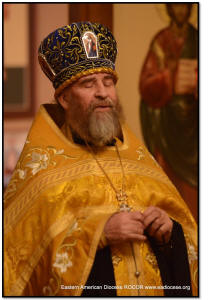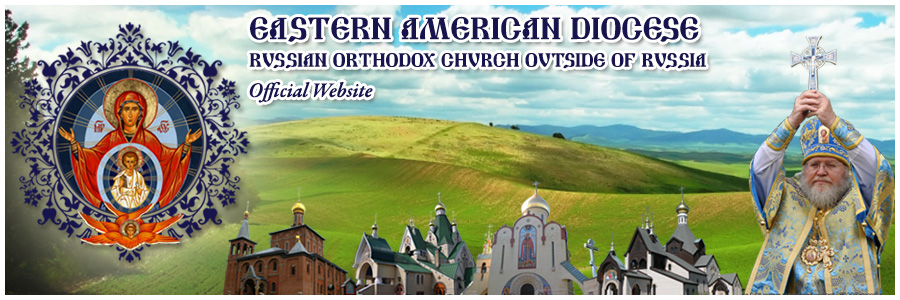
Archimandrite Ambrose (Yurasov)
sermon in St. George's Church
Howell, New Jersey - February 1,
2014
In the name of the Father, and the Son, and
the Holy Spirit!
 How
do we know if the Holy Spirit lives in us or not?
How
do we know if the Holy Spirit lives in us or not?
For the Holy Spirit to live in us, we must
toil greatly, because the Holy Spirit is not given freely, for
"Blessed are the pure in heart: for they shall see God" (Matt. 5:8).
"How can we achieve the cleaning of our soul and that it is clean?"
I asked Metropolitan Joseph of Almaty, who for 25 years was cell
attendant for a bishop of St. Petersburg and was imprisoned for 25
years for his faith – of course, the Lord gave him a clean heart and
clairvoyance. This is a divine gift. This means that the Holy Spirit
lives in him. And so I asked him.
As it turns out, the Holy Spirit lives in a
person when that person has suffered much in life: persecution,
slander, gossip. For this, the Lord gives purity of heart and the
Holy Spirit lives in that person. I met in Siberia (I lived there
for 27 years) with many such people who were exiled by the
Communists, the enemies of the Church, and there I often went to one
settlement, where there lived a quiet woman named Matryona, who
finished high school with honors, and when she was 17 years old
received great gifts from God. The Jesus Prayer was unceasing in her
heart. She went unnoticed by all, but her sister birthed seven
children and travelled among the holy places. Matryona did not
marry: she reared those seven children. She cared for chickens,
geese, a cow, and a whole farm: nobody even noticed her, but she
gave all of the children a good education.
Thus
30 years ago I came to where she lived. She asked to confess to me.
I’ve been confessing for 45 years and she said to me, "Father, at
seven years old they put me on the
kliros
and said, ‘Matryona, this is your place.’ And so my whole life I’ve
lived in the Church: I read and sang. I know all the prayers, yet
when I’m communing, I don’t know what to make of myself. When I
start reading everything through, the Jesus Prayer is interrupted in
my heart. Then I don’t understand this prayer or understand the
Jesus Prayer. What do I do?"
I said, "Mother, pray as you’ve always
prayed! The most important thing is to incline yourself!" "That is
how I live." She was already 97 years old. I had never seen that she
became annoyed or raised her voice, though I saw her often. She was
a discreet old woman, and she preserved all of the churchly
treasures of the priest: chalices, books, vestments, and none of
this was known by the government. She was covert and lived in such
simplicity. And so she left to the next world, the world of bliss… I
believe that she is a saint. The Holy Spirit lived in her.
For the Holy Spirit to enter into us, we
must have experienced many tragedies and sorrow in our life. The
Lord does not give the Holy Spirit so simply. The man who has
achieved such a condition has neither envy nor vanity nor narcissism
nor annoyance nor wrath nor annoyance nor shouting nor noise: he
keeps complete tranquility in his soul. In such a person the Holy
Spirit lives, although attacks come upon this person from all sides.
Yet the man who is prideful, narcissistic, annoyed, upset, who
judges everyone and everything – of course the Holy Spirit does not
live in such a person. Blessed Silouan the Elder said, "When a
person prays and finishes prayer, he has love for his enemy, which
means that the Holy Spirit lives in him. If we have an enemy, and
when we pray for that enemy, then he is no longer for us an enemy."
In such a person the Holy Spirit lives.
Of course, it’s never that easy. The Lord
is not frugal with the Holy Spirit, but He prudently knows to whom
to give it and to whom not to. I again repeat that nothing is so
easily given. In our lives, we must temper much, and when a person
has been so vexed, to the breaking point, and at that point wants to
say something biting to the other person, he must smile and step
outside of himself to say to that person, "Let’s go drink a cup of
tea!" Or cook up some blini to the one who vexed us so, and give
them ourselves or through someone else, if suddenly they won’t
accept them from us. But most important is that the enemy sees that
he is not an enemy to us. We must love everyone. Thus Archdeacon
Stephen the Protomartyr of Christ, when being stoned for his faith
in Christ, prayed, "O Lord, forgive them, for they know not what
they do!" He looked to the heavens and saw the Lord Christ the
Savior, Who was not sitting, but standing at the right hand of God
the Father. Why? Because this was the first martyr for Christ! And
of course our example is Christ Himself, because He was crucified on
the Cross; He also prayed, "Father, forgive them; for they know not
what they do!" (Luke 23:34)
But who showed the example of humility? The
thief! He hung on the cross and look! On the left side, the thief
berated Christ: "If You are the Son of God, come off the cross and
save us!" (Luke 23:39). Yet on the right side, the thief said, "You
shouldn’t speak like that, for we are here for our deeds, but He is
not guilty of anything," and said, "Lord, remember me when You come
into Your Kingdom," that is, "I’m not worthy of the Heavenly
Kingdom, You simply remember me. After all, I am a great sinner."
And the Lord said to him, "Today you will be with me in Heaven"
(Luke 23:40-43).
This
means that we must think of it this way, as one Holy Father Gabriel
said: "If one of us enters the Kingdom of God, we will be surprised
at three sights: one whom we thought, guessed, would definitely be
in Heaven and isn’t; one whom we didn’t guess, didn’t even consider,
but is in Heaven; and the third miracle, by what miraculous path did
I
end up here in Heaven?”
Amen!
Media Office of the Eastern
American Diocese


